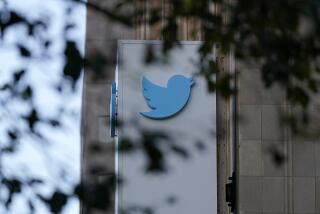Workplace e-mail ruling
Employers and workers Thursday were trying to understand their rights in the wake of a U.S. 9th Circuit Court of Appeals ruling that narrowed the circumstances under which a company could obtain the electronic communications of its employees.
A three-judge panel held that the Ontario Police Department wrongly obtained the contents of text messages sent by an officer via a wireless provider, even though the department paid the bills for the messaging service. The ruling applies to California and other Western states.
But experts said Thursday that employers still have a fair amount of freedom to inspect worker communications, provided that they follow the rules. Here are answers to some common questions about the law.
Can my employer read my work e-mail?
Probably. Most already do so. In order to avoid running afoul of state law, though, the company generally should monitor communications for a legitimate business purpose and warn employees that it’s doing so. For example, acting on a reasonable suspicion that trade secrets are being leaked is a legitimate purpose. Checking to see where someone is headed on vacation is not.
Wednesday’s court opinion in Quon vs. Arch Wireless made more explicit an exception to the rule. If the e-mail messaging service is provided by a third party, and those messages are stored only briefly to ensure their delivery, then the employer is out of luck. On the other hand, if the third party routinely hangs on to such material for months, storing them for business reasons at the employer’s request, the company is entitled to have a look.
Can my employer read text messages I send and receive through a work phone or hand-held device?
Probably not. Most text messages, including those sent via cellphones, go through a wireless communications provider, and most such content is purged quickly. Under the ruling, an employer can’t get access to messages with so short a life span.
Instead, the company must either ask the communications provider to maintain copies for a substantial amount of time for regular review or make sure that the messages are routed through the company’s own equipment and archived there. Some Wall Street firms and other highly regulated companies already do this for phone messages and instant messages sent via the Internet.
Can my employer read messages that I send and receive through Gmail, Yahoo Mail and other Web services while at work?
Probably not without your permission. Companies could ask new hires to grant such permission as a condition of employment, or in exchange for the right to use such services at all. Otherwise, such communications would probably be ruled private because the employer isn’t providing the essential service.
What if I work for a government agency?
Government employees get more protection than private-sector workers -- a difference underscored by Thursday’s decision. In addition to following state laws, government employers must be careful to comply with the 4th Amendment’s prohibition of unreasonable government searches.
No matter what the stated policy in the workplace, employees must have no reasonable expectation of privacy in order for the searches to be legal. That depends on the facts of each instance. In the Ontario police case, the policy was that messages could be read. But the officer’s superiors had indicated that they would not read them, undercutting the policy.
--
Times staff writer Michelle Quinn in San Francisco contributed to this report.
More to Read
Inside the business of entertainment
The Wide Shot brings you news, analysis and insights on everything from streaming wars to production — and what it all means for the future.
You may occasionally receive promotional content from the Los Angeles Times.










